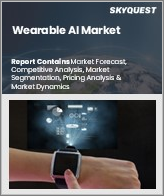
세계의 웨어러블 AI 시장 규모는 2023년 423억 달러로 평가되었고, 예측 기간 중(2025-2032년) CAGR 29.2%로 나타날 것으로 보이며, 2024년 546억 5,000만 달러에서 2032년까지 4,243억 3,000만 달러로 성장할 전망입니다.
이 시장은 인공지능(AI)과 5G 스마트폰 채용 등 신기술의 급증에 힘입어 강력한 성장을 이루고 있습니다. 특히 밀레니엄 세대와 Z세대에서 AI 대응 스마트 웨어러블이 대두해 IoT와 무선 기술의 진보가 견인하고 있습니다. 특히 Apple이 2024년에 발표한 Apple Watch 시리즈 10은 포도당 추적과 수면 분석 등 AI 주도의 건강 기능을 탑재하고 있어, 이 동향을 상징하고 있습니다. 또한, 도시화에 의해 현대의 소비자 요구에 응하는 다기능으로 심미적으로 매력적인 제품에 대한 수요가 높아지고 있습니다. 소비력이 높아지면서 스마트 워치에 대한 선호도가 가속화되고 있습니다.
Global Wearable AI Market size was valued at USD 42.3 billion in 2023 and is poised to grow from USD 54.65 billion in 2024 to USD 424.33 billion by 2032, growing at a CAGR of 29.2% during the forecast period (2025-2032).
The market is experiencing robust growth fueled by the surge in emerging technologies like artificial intelligence (AI) and the adoption of 5G smartphones. The rise of AI-enabled smart wearables, particularly among millennials and Gen Z, is driven by advancements in IoT and wireless technology. Notably, Apple's 2024 launch of the Apple Watch Series 10, equipped with AI-driven health features such as glucose tracking and sleep analysis, exemplifies this trend. Moreover, urbanization is propelling demand for multifunctional, aesthetically appealing products that cater to modern consumer needs. Millennials' increased spending power during work hours has accelerated their preference for smartwatches. Overall, the integration of 5G, biosensors, and other innovative technologies is fundamentally reshaping the wearable device landscape.
Top-down and bottom-up approaches were used to estimate and validate the size of the Global Wearable AI market and to estimate the size of various other dependent submarkets. The research methodology used to estimate the market size includes the following details: The key players in the market were identified through secondary research, and their market shares in the respective regions were determined through primary and secondary research. This entire procedure includes the study of the annual and financial reports of the top market players and extensive interviews for key insights from industry leaders such as CEOs, VPs, directors, and marketing executives. All percentage shares split, and breakdowns were determined using secondary sources and verified through Primary sources. All possible parameters that affect the markets covered in this research study have been accounted for, viewed in extensive detail, verified through primary research, and analyzed to get the final quantitative and qualitative data.
Global Wearable AI Market Segments Analysis
Global Wearable AI Market is segmented by Product, Operation, Application and region. Based on Product, the market is segmented into Smartwatches, Fitness Trackers, AR/VR Headsets, Wearable Cameras, Smart Earwear, Smart Clothing & Footwear and Other Products. Based on Operation, the market is segmented into On-Device AI and Cloud-Based AI. Based on Application, the market is segmented into Consumer Electronics, Healthcare, Enterprise & Industrial and Other Applications. Based on region, the market is segmented into North America, Europe, Asia Pacific, Latin America and Middle East & Africa.
Driver of the Global Wearable AI Market
The global wearable AI market is experiencing significant growth due to a rising awareness of personal health and wellness. Consumers are increasingly interested in wearable devices, including smartwatches, fitness bands, and smart rings, which provide real-time monitoring of vital signs like heart rate, oxygen saturation, and sleep quality. The incorporation of AI-powered predictive health analytics has also played a crucial role in this trend, making these devices invaluable for preventive healthcare. As individuals prioritize their health and seek tools that support their well-being, the demand for innovative wearable technology continues to surge, further propelling the market forward.
Restraints in the Global Wearable AI Market
The prohibitive cost of premium wearable AI devices poses a notable challenge to their widespread acceptance within the market, even as it continues to grow. Devices that incorporate advanced technology, such as AI analytics, 5G connectivity, and biometric sensors, often come with a hefty price tag, primarily making them accessible to affluent consumers. For instance, high-end offerings like the Apple Watch Ultra and Garmin smartwatches boast features such as dive tracking, satellite communication, and AI-enhanced training, yet their prices are considerably higher than more affordable options. This price disparity hampers broader market penetration among diverse consumer demographics.
Market Trends of the Global Wearable AI Market
The Global Wearable AI market is experiencing a significant transformation driven by the rising demand for medical-grade wearables that enable real-time health tracking and remote patient monitoring. Key players like Abbott and Medtronic lead the charge with innovative biosensors offering continuous glucose monitoring for diabetes management, while AliveCor's wearable ECG patches empower users to identify cardiac abnormalities swiftly. This trend is reshaping healthcare by increasing patient engagement and improving clinical outcomes, as consumers and healthcare providers alike embrace the convenience and accuracy of portable health technologies. The continued integration of AI into these wearables promises even greater advancements, fueling further market growth.